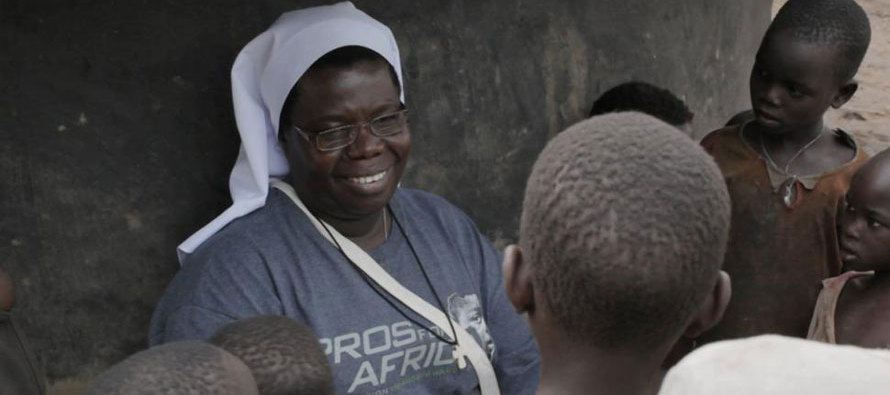Beholden to no one but God

Image: Sister Rosemary Nyirumbe in the documentary Sewing Hope (Snagfilms).
Last year, a Catholic journalist had an assignment to interview religious sisters about their work. As she made call after call, a theme emerged: The sisters saw the journalist, and publicity in general, as a nuisance to endure or, if possible, to avoid. “I just don’t want to be part of your story,” said one. Another sister, doing heroic ministry among Mexican immigrants working in the strawberry fields of California, told the journalist about learning she’d been nominated for an award from a Catholic organization. “I sat down and cried,” she said. And not for joy.
The journalist interviewed Sister Rosemary Nyirumbe from Uganda during one of her periodic visits to the United States. Sister Rosemary runs a school for Ugandan girls who were abducted and forced to become child soldiers. She told the journalist that when some of her wealthy American supporters suggested making a movie about her work, she refused--for one whole year. Only when persuaded that it would help fund her important work with the girls did she reluctantly agree. The movie, Sewing Hope, tells the story of Sister Rosemary’s bravery and persistence in working with these girls, who have been abused and then cast out by everyone.
Perhaps these sisters, and other men and women in consecrated life, need a crash course in how to grab their 15 minutes of fame. I bet we can dream up a long list of celebrities who could tutor them.
James and John, the impetuous brothers whom Jesus nicknamed the “Sons of Thunder,” blunder into their own publicity-grabbing moment in Mark’s gospel. As they journey with Jesus toward Jerusalem, where the Passion awaits him, they are tone-deaf enough to ask Jesus for privileged seats at his right and left hand once he comes into his glory. The rest of the disciples promptly get teed off that they hadn’t asked Jesus the same question.
With great patience, Jesus tells all of them that true greatness comes not from power, prestige, and lording it over others, but from giving away one’s life. “Whoever wishes to be great among you will be your servant,” he says.
Men and women in consecrated life know that once you’ve given away your life, you are free. And that freedom allows you to follow the Spirit wherever it might lead. In his letter for the Year of Consecrated Life, Pope Francis asked religious to “wake up the world” by living up to their call to be prophets—people who know how to read the signs of the times and denounce injustice. He pointed to their freedom: “Because [prophets] are free,” the pope said, “they are beholden to no one but God. ... Prophets tend to be on the side of the poor and the powerless, for they know that God himself is on their side.”
Pope Francis was right. In the bleakest corners of our country and our world, you are almost certain to find a sister, a brother, or a priest working among the poorest of the poor, giving their life away. Men and women in consecrated life work with the rural poor, with farmworkers, immigrants, the illiterate, refugees, the sick, those in prison, and with young people trying to escape violence in the toughest neighborhoods of our cities. Women religious have been singled out by the United Nations as one of the most vital groups in the fight against human trafficking. Men and women religious also advocate for legal remedies that would make ours a more just society in areas of health care, immigration, and growing economic inequality. Because they are usually too busy to tell their own stories, they mostly do all of this with no fanfare.
We can also look with gratitude on the sisters, brothers, and priests who taught us in school, who took us on retreats and service trips, who cared for us in hospitals, who challenged us as young adults in college, and who continue to serve in our parishes, as well as those in monasteries who pray for the world every single day.
The late film critic Roger Ebert wrote with great fondness of how the Dominican sisters at his grade school in Urbana, Illinois taught him his core moral principles, such as empathy and economic fairness. The sisters, he said, guided him to support “the rightness of labor unions, fair taxation, prudence in warfare, kindness in peacetime, help for the hungry and homeless, and equal opportunity for the races and genders.”
As Ebert realized, those in consecrated life remind us of what we all believe deep down: that life isn’t about money, sex, power, prestige, fame. That it’s all about love and service, and what we give away.
Tags
Related
- VocationMatch.com Trends on Religious Life
- Bold and Faithful: Meet Today's Religious
- VOCATION FACT SHEET
- TAKE FIVE WIDGET
- FOR PARISHES & PREACHERS: Sample homilies that encourage vocation discernment
- VOCATION PRAYERS | Vocations prayers | Prayers for vocations
- VOCATION RESOURCES: Myths busted and questions answered
- FOR PARENTS: Fostering happiness, holiness, and faithfulness
- Consecrated life: Words of wisdom
- FOR DREs | TEACHERS | CATECHISTS Read More
Most Viewed
- Find your spirituality type quiz
- Questions and answers about religious vocations
- Celibacy quiz: Could I be a nun? Could I be a brother? Could I be a priest?
- Resources for older discerners or those with physical and developmental differences
- About Vocation Network and VISION Guide

